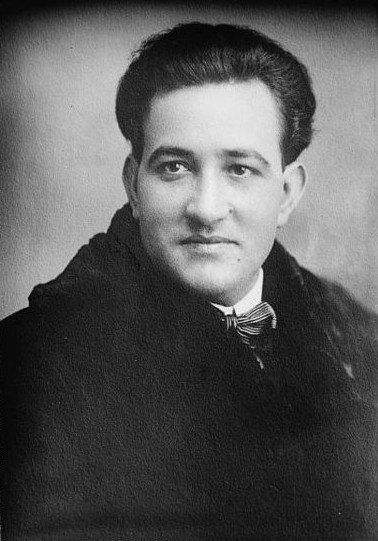Miguel Fleta
1 December 1897 Albalate de Cinca – 28 May 1938 A Coruña
In RA format
Young Fleta worked as a shepherd and a bricklayer, and was an amateur singer of folk music. In 1917, he enrolled at the conservatory in
Barcelona; his voice teacher there, French soprano Luisa Pierrick, became his mentor, manager, lover, and first wife.
Fleta made his debut in 1919 in Trieste as Paolo in Zandonai's Francesca da Rimini. Via Prague and Vienna (Volksoper), he soon
arrived at major Italian theaters (Genova, Rome) as well as at the Colón of Buenos Aires, in Rio de Janeiro and in Madrid (Teatro Real).
His rise was spectacular, and he all too quickly became one of the greatest operatic stars in the world; he even sang in Japan, and in 1924
arrived at La Scala. His "Ay, ay, ay" recording was the first disc ever that sold more than 1 million times.
In November 1923, Fleta made his Met debut; he had a contract for three seasons, but sang only two of them, while in
1925/26, he preferred to stay in Milano to prepare the world premiere of Turandot at La Scala, where he sang Calaf, a role that did not
suit him (he sang only a handful of performances). The Met sued him for breach of contract, and obtained a huge penalty from Fleta. (Fleta did
the same thing again in 1932 to the Teatro Calderón in Madrid, and was sued again; this time, both parties had to pay penalties, the
theater for expecting Fleta to overfulfill his contract, and the singer for consequently refusing to sing at all.)
Fleta was, as we can see, difficult, spoiled, conceited. He was prone to excesses of all kinds, eating and drinking, above all; his health was
affected by an early syphilis infection that had not been expertly cured. All in all, he quickly ruined his voice. His technique had always had
its faults (Spanish quiver, detached top register), and his success was fruit of his outstanding, imaginative musicality and individual
interpretations, much more than of his technique (except for his truly exceptional breath control, and diminuendo). In the years of his youth
and glory, he sang incredibly many performances, and often of a heavier repertory than he should have chosen. And so his voice gave in: early on
(from 1922 already!), he developed regular throat problems. In 1927, he divorced Pierrick. From 1928, he was on a decline just as quick as his
rise; from 1930, he sang only irregularly, exclusively in Spain, and mostly in zarzuela. His very last performance was in 1937 (Don José
in Lisbon).
From 1936, he was officially a member of the Falange (the Spanish Fascists led by Franco). Fleta did not fight the Civil War, but was a very
active Falange supporter, distributing leaflets or borrowing his private car to the party. He also recorded the anthem of the Spanish Fascists.
His involvement was prominent enough that the royalists condemned him to death. However, soon after, he died of a natural cause (uremia).
Reference 1: Youtube channel "Dead Tenors' Society"; reference 2; reference 3; reference 4; reference 5: Kutsch & Riemens
Repertory
Francesca da Rimini – Trieste, Verdi, 14 (or 19) December 1919
Aida – Trieste, Verdi, 24 January 1920
Mefistofele – Wien, Volksoper, 8 May 1920
Tosca – Wien, Volksoper, 11 May 1920
Pagliacci – Wien, Volksoper, 21 May 1920
Carmen – Wien, Volksoper, 26 May 1920
La rondine – Wien, Volksoper, 9 October 1920
Rigoletto – Praha, Neues Deutsches Theater, 23 November 1920
Andrea Chénier – Piacenza, Municipale, 3 February 1921
Giulietta e Romeo – Roma, Costanzi, 14 February 1922
Cavalleria rusticana – Buenos Aires, Colón, 24 July 1922
Flor de Nieve (composer: Gaito) – Colón, Buenos Aires, 3 August 1922
Il Guarany – Rio de Janeiro, Municipal, 7 September 1922
La Dolores – Ciudad de México, Esperanza Iris, 12 December 1922
Manon – Buenos Aires, Colón, 5 June 1923
I compagnacci (composer: Riccitelli) – Buenos Aires, Colón, 22 July 1923
La sonnambula – Buenos Aires, Colón, 31 July 1923
L'amico Fritz – New York, Met, 15 November 1923
La traviata – Buenos Aires, Colón, 5 August 1924
La bohème – New York, Met, 4 November 1924
Les contes d'Hoffmann – New York, Met, 13 November 1924
El dúo de La africana (composer: Fernández Caballero) – Madrid, Real, 1925
Marina – Madrid, Apolo, 22 February 1926
Turandot – Milano, Scala, 25 April 1926
La favorite – Valencia, Principal, 6 (or 10) May 1926
L'Africaine – Valencia, Principal, 8 (or 7) May 1926
Lohengrin – Barcelona, Liceo, 14 December 1926
Lucia di Lammmermoor – Roma, dell'Opera, 22 March 1928
Doña Francisquita – Madrid, Calderón, 1932
La Dolorosa (composer: Serrano) – Gijón, Plaza de Toros, 1933
Los claveles (composer: Serrano) – Gijón, Plaza de Toros, 1933
Luisa Fernanda – Barcelona, Olimpia, 1934
Christus (composer: Álvarez García) – Madrid, Calderón, 11 February 1936
La tempranica (composer: Giménez) – Barcelona, Novedades, 1936
El caserío (composer: Guridi) – Barcelona, Novedades, 1936
Reference 1: The Record Collector, July–September 1992
Reference 2: Alfonso Carlos Saiz Valdivielso: Miguel Fleta, memoria de una voz, Laga Ediciones, 1997
Reference 3: Fernando Solsona Vida, obra y persona de Miguel Fleta, Gobierno de Aragón, 1998
I wish to thank Thomas Silverbörg for the recording.
|
